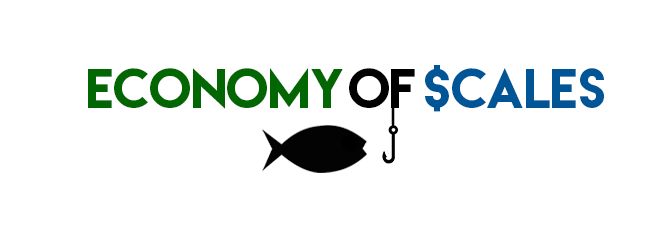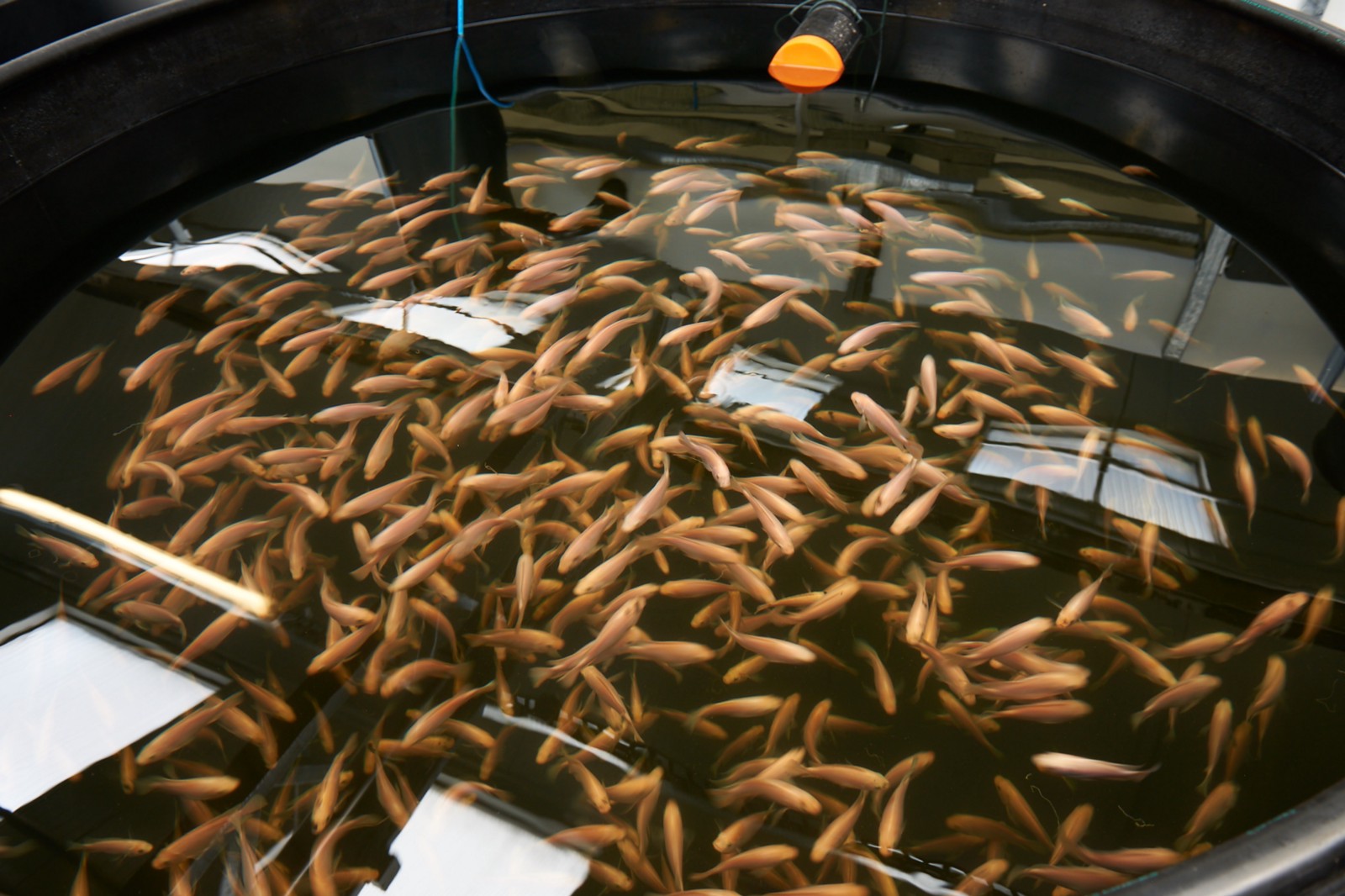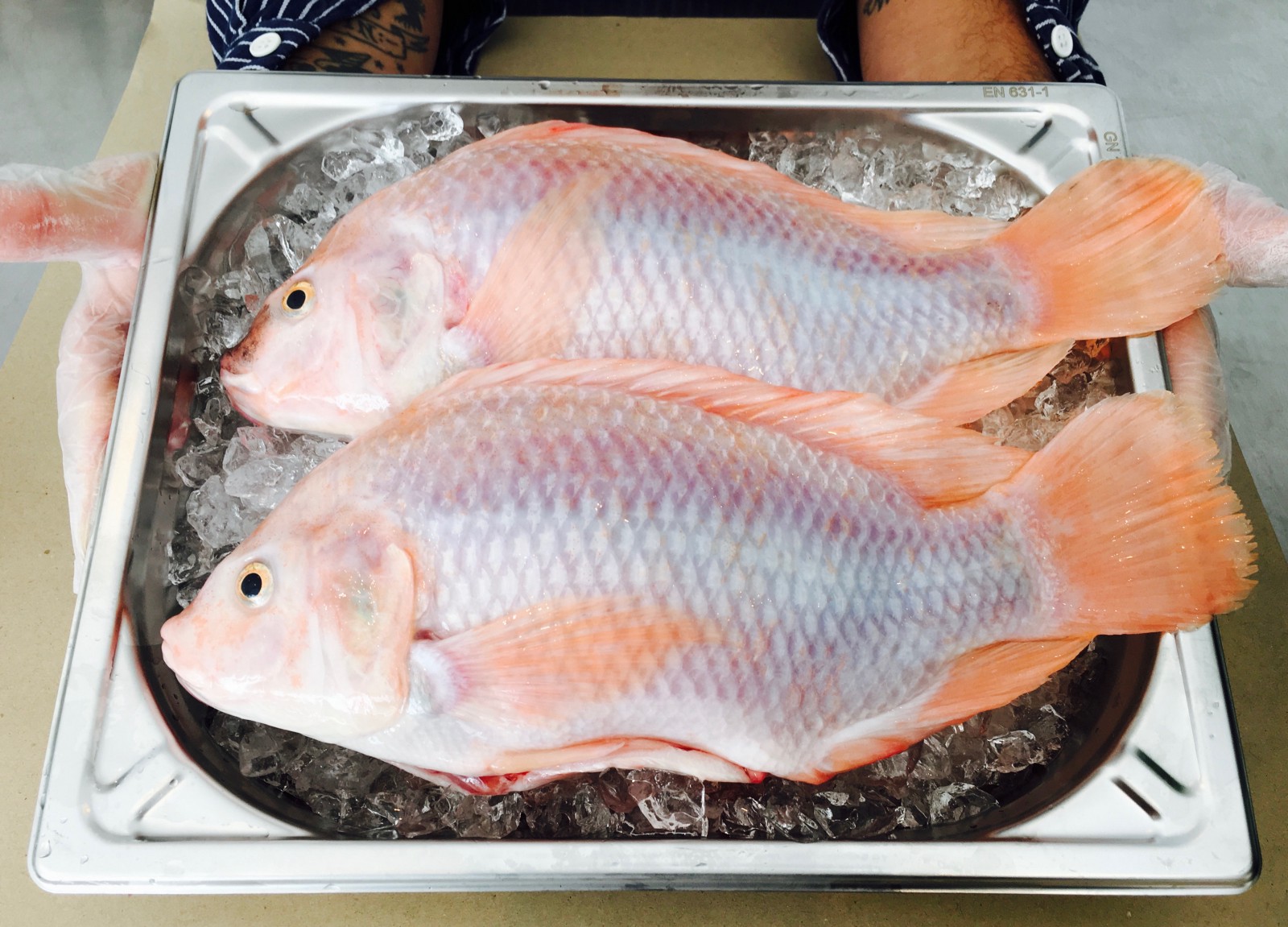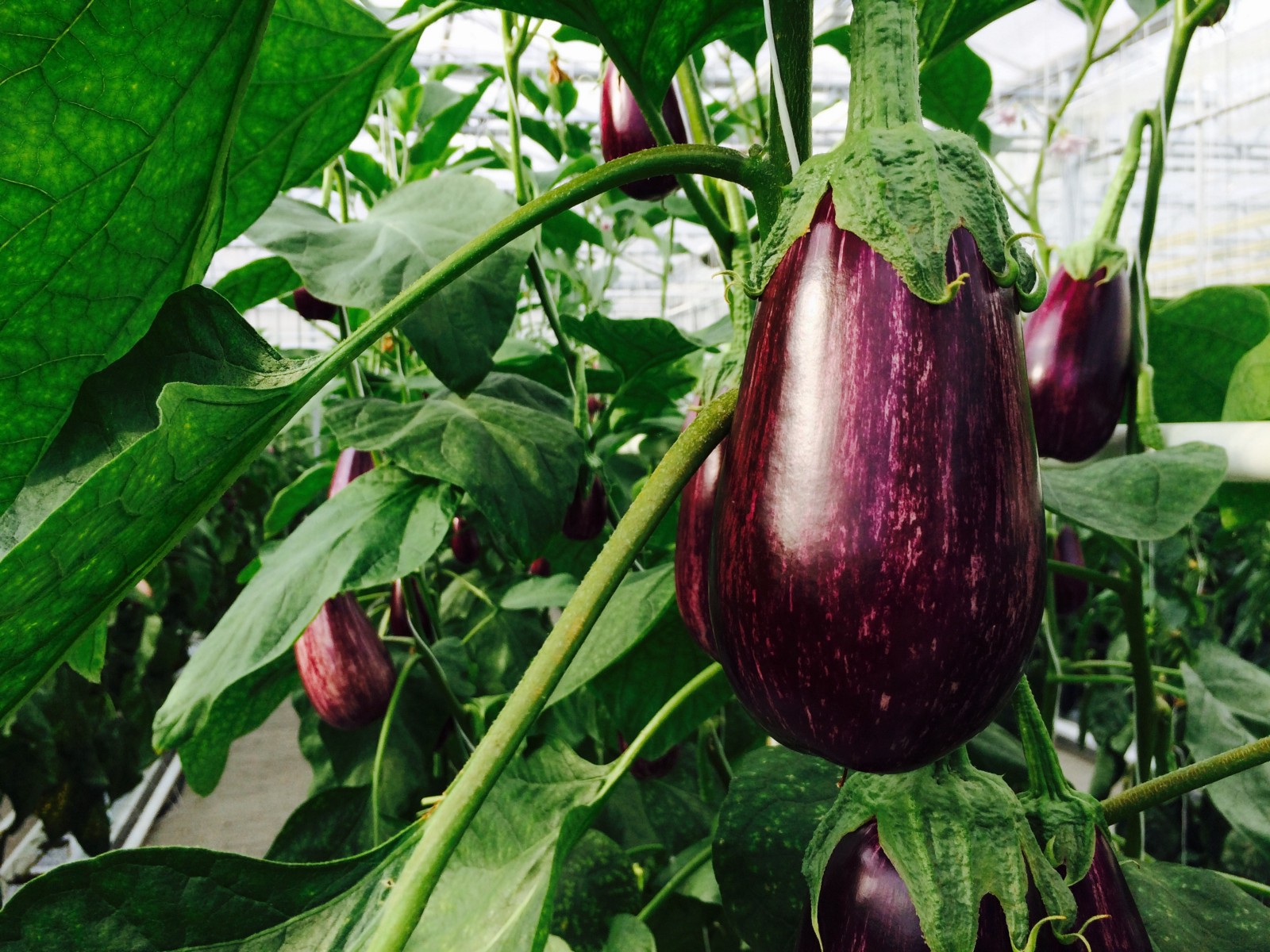The start-up culture in Berlin’s capital city has attracted a new, investor-funded aquaponic initiative that farms fish and vegetables in water — and they’re planning to spread across Europe.
By Elizabeth Rushe
(Photo: ECF Farmsystems Berlin)

This week, Pacific Standard
looks at the global seafood industry — how it’s responding to class, consumer trends, and a new climate.
Berlin hosts a thriving start-up economy. According to a 2015 global ranking, Berlin has the fastest-growing start-up economy in the world, with a new start-up born there every 20 minutes. Two years ago, ECF Farmsystems sprouted up in Berlin — a new start-up that stands out among giants like Rocket Internet, Zalando, Soundcloud, Airbnb, and Etsy, all of which have headquarters in the German capital. ECF is different: It’s an inner-city farm for fish and vegetables.
Walking across the ECF cobblestone courtyard, a pathway leads you through grassy banks to the 1,800-square-meter farm compromised of warm and cold greenhouses and an aquaculture room. Pressing your nose up against the greenhouse windows from outside you can ogle plump, delicious-looking tomatoes in a rainbow of colors, dangling on vibrant green vines. There is little to no sign of pest or disease. You can also perch atop ladders and peer into 8,000-liter fish tanks swirling with tilapia (also called “rose perch” thanks to their reddish hue). ECF christened their fish “Haupstadtbarsch” — “Capital-city perch” — and co-founder Christian Echternacht points to the ecological benefits of aquaculture: Agriculture accounts for 70 percent of global water withdrawals and 24 percent of greenhouse gas emissions, while 77 percent of global fishing stocks monitored by the United Nations’ Food and Agriculture Organization are either depleted, over-exploited, or fully exploited — with only 1 percent of those stocks in recovery from depletion. Aquaculture promises a far more sustainable model.
ECF’s goal is to cover the planet with aquaponic systems, on rooftops and urban sites around the world.
ECF is two things: First, it’s a living, breathing aquaponic farm, slap bang in Berlin city, in the neighborhood of Schöneberg — where David Bowie and Iggy Pop famously lived in the 1970s. After spending a hellish Saturday afternoon in nearby IKEA, you could literally walk all of four minutes down the road to the ECF farm, and see where your fresh fish and vegetables are grown. ECF is comparably prolific, farming 30 tons of fish per year; in 2015, the company quoted its output at 30 tons of veggies.
Second, the ECF farm in Schöneberg is a proof of concept that urban aquaculture can work, and ECF keeps busy planning and constructing aquaponic farms for fellow entrepreneurs; ECF even offers to recruit and train potential staff in Berlin for their farmpreneur clients.

(Photo: ECF Farmsystems Berlin)
An aquaponic farm combines aquaculture (fish farming) and hydroponics (growing produce out of water, instead of soil). Echternacht and his co-founder Nicolas Leschke initially teamed up with fishery and gardening experts to hammer out the details to come up with ECF’s system of aquaponics, in which vegetable cultivation and fish-breeding complement each other.
The process begins in four fresh-water cisterns that sit outside the building and collect rainwater. From the cisterns, the water enters the fish cycle first, into the fish tanks ranging from 3,000- to 8,000-liter capacity, with relative densities of 95 percent water to 5 percent fish. The fish excrete ammonia into the water, which a biofilter converts into nitrate. The nitrate-rich water then circles back to the fish cycle while also watering plants in the greenhouse (nitrate is a mineral plants require for healthy growth).
On the plant side, the new water cycle begins: water tanks fill up with nitrate-enriched water from the fish, with additional nutrients sometimes added, for “heavy-feeder” plants like tomatoes, which require more than the usual nutrients, particularly iron. ECF is currently focused on growing varieties of tomatoes, but Echternacht gives examples of other plants that do well in the system, including eggplant, peppers, and cucumbers.
From there, irrigation drips deliver the water to the plants, directing the water exactly where it’s needed. The water in the greenhouse does not circle back to the fish tanks for a number of reasons; among other things, fish need a pH level of 7, whereas plants need a pH level of 5. In traditional aquaponics, an average pH might be used across the whole system loop, but ECF maintains the desired pH for fish and plants separately — one of the company’s unique selling points.

(Photo: ECF Farmsystems Berlin)
A major concern with aquaculture is carbon dioxide emissions, as fish release CO2 into the atmosphere; ECF solves the dilemma by pumping the warm, CO2-enriched air into the greenhouse, where it’s converted to oxygen by the plants — heating the greenhouse in winter too — and then pumped back to the fish room. The connection between plants and fish is attractive to business owners who already farm one or the other — take the tomato producer in Vienna, for whom ECF is constructing an aquaculture farm that will build off his already-existing tomato greenhouse. The tomato producer thus diversifies his business while getting double usage from his water and cutting down on fertilizer inputs with the enriched water from the fish.
With construction costs of €1.5 million and annual operating costs of €450,000, ECF is funded by a private investor, and by Berlin investment bank, IBB, which matched the private investment. When ECF opened in spring 2015, one of the first programs it rolled out was a community-supported agriculture order system, to supply 250 Berliners with weekly veggie boxes. Within days, the list was full, and, within weeks, the “farmer-boys,” as they call themselves, had a waiting list of four months.
While the CSA certainly helped ECF with publicity, it proved problematic — the program required too much of its resources,
“Economically it was a success, but it was a big hassle,” says Echternacht, smiling ruefully. ECF realized that they lost a lot of flexibility by setting up the CSA, as the organization now found itself focused solely on keeping up with orders, instead of experimenting with, say, growing potatoes aquaponically, or cultivating liquorice-marigold for a local Michelin-star chef — a couple of the pet projects on site at the moment. “It was a fantastic situation, but not for this flagship farm,” Echternacht says.

Hydroponic eggplants. (Photo: ECF Farmsystems Berlin)
After closing the CSA program, ECF made a strategic decision to re-locate the farm shop to Markthalle Neun in Kreuzberg, less than a half-hour bike ride across town. Markthalle Neun is a traditional indoor market hall that dates back over 100 years and was renovated a few years ago to grand effect: These days Markthalle attracts thousands of people a week, thanks to popular weekly events like Street Food Thursday and the Breakfast Market, where local vendors serve up savory pies and smoked barbecue, and where, among the stalls of Egytian, Yemenese, and Japanese street-food, customers can also buy ECF’s Berlin-farmed fish and vegetables.
Even though the main ECF farm at Malzfabrik is accessible, with bus and U-bahn stops nearby, it’s undeniable that Markthalle attracts far more visitors than ECF’s main location in Schöneberg, where the farm shop no longer operates on site. “Several thousand people pass through Markthalle a week, which is the amount of people that might pass through ECF in a year,” Echternacht says. “Our first goal was to have the technology running, the second was to have the production running, with good products to sell. The third is to sell those products — which we are in the middle of accomplishing.”
As well as supplying wholesalers and haute cuisine restaurants, ECF has tapped into the consumer market, giving folks a chance to cook their own Berlin-grown fish-and-veggie-chips supper at home. ECF also supplies a mainstream supermarket chain in Berlin — Kaisers — with its Capital City perch.
In 2015, ECF completed a 1,200-square-meter rooftop aquaponic farm in Switzerland, with an annual output of 14 tons of fish and 30 tons of vegetables, for ecco-jaeger, a fruit and vegetable company founded in 1930. This year, the ECF team will complete construction on another historic site, this time a 2,000-square-meter farm at Abattoir in Brussels, an actual abattoir which dates back to the 19th century and hosts popular weekly markets, attracting thousands of visitors each week.
ECF’s goal is to cover the planet with aquaponic systems, on rooftops and urban sites around the world — and its plan seems to be on track. Echternacht says the company has already undertaken more planning studies this year than they expected, including requests from entrepreneurs who want to build ECF aquaponic farms in Paris and Albania. Next year, ECF hopes to build four farms; in 2018, eight.
“At that point we’ll be ‘writing black numbers’ as we say in German,” Echternacht says, referring to profits. He has a keen sense of humor about ECF’s role in the city’s entrepreneurial scene. “Amongst the Berlin start-ups, we stand there with dirt under our fingernails — we grow tomatoes.”

||





